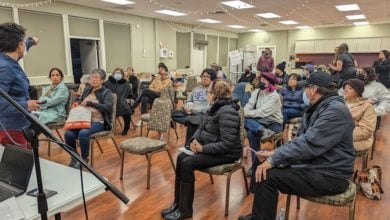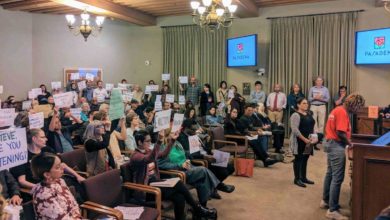Beginning in October 2020, workers across California have seen their unemployment accounts frozen or drained of funds. The state’s Employment Development Department contracts out the disbursement of benefits to Bank of America, which issues debit cards to claimants. Since the last report by the EDD on Oct. 29 last year, nearly 693,000 Bank of America EDD accounts were suspended, or frozen, due to suspected fraud.
The Dec. 7 LA Times reported that the collective amount of these accounts totaled close to $2 billion. On New Year’s Eve, it was reported that up to 1.4 million of the state’s on-line unemployment insurance accounts were suspended. As of last month there were over 900,000 unemployment claims in backlog, meaning there were nearly a million people whose disbursement accounts were suspended or who were unable to submit new unemployment applications.
While we have seen the financial crisis of the COVID-19 pandemic for the near entirety of 2020, this issue will require a continuing struggle in 2021 for access to urgently needed benefits.
B of A and EDD share the blame
While the pandemic caused a huge increase in applications for unemployment benefits, which the state was not prepared to handle, the EDD and Bank of America share responsibility for whatever fraud that has occurred. For example, the EDD sent claimant Social Security numbers through the mail and failed to cross check claimants’ identities with prison data. It also did not require B of A to include security chips in their debit cards, which the bank then omitted.
The Jan. 19 New York Times reported that B of A was being sued “for failing to use standard security measures to protect people after it was discovered that thousands had their debit cards drained by thieves and complaints made to the bank were unanswered or even penalized.” Filed on Jan. 14, a class-action lawsuit, Yick v. Bank of America, specifies that the bank “failed to secure its EDD debit cards” — referring to the lack of chip technology.
The crisis to pay for rent, utilities, food, student loan debt, personal protective equipment, health care, and education has only worsened because of actions by the Bank of America to freeze claimants’ accounts and drain funds. Individuals have reported frozen or missing funds upwards of $20,00 for a single account, making it nearly impossible to pay for everyday needs.
One of the main fraud indicators the EDD cites from Bank of America is “a high volume of claims filed at a single address.” Since many working-class families share addresses and rental spaces to afford the high rents in California, they are most vulnerable to fraud indicators that B of A uses to freeze or drain bank accounts. It is the underpaid and unemployed workers who are most vulnerable to the theft of funds by Bank of America and the new red tape introduced to the unemployment claims process.
Beginning in October 2020, the EDD introduced a new identity verification software, ID.me, to assist with verifying the identity of unemployment applicants. Yet, for undocumented and immigrant workers, the software does nothing but create another barrier to receive or re-validate unemployment benefits. Despite the addition of identity verification software, Bank of America is still reporting an increase of post-application fraud.
To further complicate the process for unemployed workers, Bank of America has its own fraud verification system to re-approve the identity of people who have had their accounts suspended or drained of funds and may actually legitimately need unemployment assistance. Of the 693,000 accounts marked as fraudulent in October 2020, 29,000 people reached out to dispute the claims and verify their identity.
Bank of America and the EDD’s attempts to prevent fraud through stringent ID verification processes ended up negatively impacting masses of people who committed zero fraud. Do we really trust Bank of America and EDD to handle these processes? They have shown they only do so in a way that benefits themselves and not the people.
How are workers affected?
With the onset of the COVID-19 pandemic, along with the worst recession and unemployment since the Great Depression, workers are feeling the worst impacts of the crisis. Even with the crisis, people still need to pay for food, utilities, bills, things that are needed for survival. Recently, President Biden signed an Executive Order to extend the federal eviction moratorium to March 31. But when that time comes, what will happen to the workers, especially those relying on withheld unemployment benefits?
The time-line of the unemployment insurance backlog crisis has shown one simple truth — many people cannot get access to the benefits they need to survive. Anyone who has ever had to deal with the EDD for unemployment benefits or State Disability Insurance, including but not limited to people who lose their jobs, go on maternity leave, or need disability insurance, already know how challenging the application process can be.
Among the multinational working class who apply for unemployment insurance, many individuals are people who don’t know English, people who don’t have ID documents such as a passport or driver’s license, and people who may never have used email. Many of these individuals need assistance to access the on-line unemployment application process.
Much media directed attention to claims filed in the name of prisoners, estimating a total of $400 million in “erroneous payments.” Meanwhile, earlier in 2020, U.S. banks made a quick $10 billion through simply processing the Small Business Administration loans that were a part of the CARES Act.
Bank of America chooses profit over lives
Since New Year’s Eve, millions of individuals with existing unemployment benefit accounts have experienced fraudulent account flagging. An additional unknown number of new unemployment benefit applicants have to meet impossibly stringent ID verification, and they join existing beneficiaries in the backlog of individuals who can’t make ends meet.
As of last month there were over 900,000 unemployment claims in backlog, meaning there were nearly 1 million people whose disbursement accounts were suspended or people were unable to even process a new unemployment application to begin receiving much-needed money. The EDD and Bank of America should immediately un-suspend all accounts and release the queued amount of claim money owed to everybody, as most of the accounts are people who need the money to survive.
The State of California has never addressed its inadequately resourced EDD, ensuring that such an important department would not be able to deal with claim surges in times of crisis. It also cultivates cozy partnerships with Bank of America and ID.me, corporations that do not care about the people’s welfare. From slowing down Small Business Administration loans, years of shady mortgages, and grifting off of ATM fees, Bank of America has swelled itself with state wealth that rightly belongs to the people.
How unemployment insurance was won
We can look back at the history of unemployment insurance and see that benefits were never gifted to the people — mass movements had to fight for them. The Wall Street crash of 1929 spurred on the Great Depression. By 1933, 11 million were unemployed (around a quarter of the labor force at the time), and workers were left to starve, with little government aid. In response, hundreds of thousands of workers nationwide protested on the streets demanding “Fight, don’t starve.” Unemployed Councils popped up organized by communist groups and trade unions, directing the struggles of the unemployed for unemployment insurance, public works programs, and subsidized food and housing. Through militant struggle and pressure from the masses, major reforms, like unemployment insurance, were gained.
A socialist re-organization of society would expropriate the wealth stolen by banks such as Bank of America and eliminate unemployment altogether. A socialist government would prioritize the needs of the people not corporate profits.
Photo credit: Brian Katt (Wikimedia Commons)






